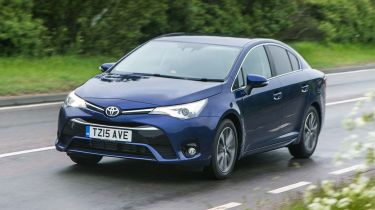Toyota Avensis (2015-2018) review - MPG, CO2 and Running Costs
With fleet buyers in mind, Toyota has made Avensis frugal to run which is a bonus for private buyers

Choosing a diesel engine in your Avensis is the best decision as not only is more efficient on the road but it's also a more pleasant engine to live with.
The most frugal is the 1.6-litre. It's a BMW-derived engine and is smooth enough and can return up to 67.3mpg and emitting 109g/km of CO2.
The only other diesel in the range is another BMW-derived unit – the 2.0-litre D-4D. It can return 62.8mpg and emitting 119g/km of CO2 on 17-inch wheels, and is the pick of the range for most company car drivers. Up-spec to 18-inch wheels and there is a slight penalty in BiK tax although there's very little difference between manual or automatic gearboxes.
With rivals car makers offering downsized petrol engines with turbochargers, the Avensis' naturally-aspirated 1.8-litre engine looks old. Available with either a six-speed manual or a six-speed automatic gearbox, it's the auto that's the most frugal – 47.9mpg and 140g/km. It is a bit lethargic though and not particularly sparkling to drive.
Toyota offers no other engine choices in the Avensis. Unlike VW or Ford or Skoda, there's no eco-special – these firms, for instance, offer 1.6-litre diesels that can return (claimed) in excess of 70mpg.
Insurance groups
The cheapest Avensis models to insire are the petrol powered ones which sit in groups 16-17. The diesels call in categories 20 and 24, so premiums are a little higher.
Depreciation
The Avensis holds onto its value pretty well. Our experts have calculated all models hold onto between 39 and 46 per cent of their value after three years, which is better some rivals like the Vauxhall Insignia.







